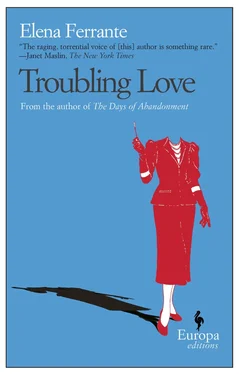I, too, remembered those images. My father had done them for years, even without Caserta. It seemed that the sailors, with their endless sighs, had nearly worn away the paper images of their women. They were pictures of mamas, of sisters, of fiancées, all blond, all smiling, all photographed with permanents, not a hair out of place, jewels at their necks and ears. They seemed to be dolls. And also, as in the picture of us that Amalia treasured, as in every photograph corroded by absence, the patina of the print was faded and the image often folded at the corners or disfigured by white creases that cut across faces, dresses, necklaces, hairdos. They were faces dying even in the fantasies of those who held on to them with desire and a sense of guilt. My father took them from Caserta’s hands and attached them to the easel with a thumbtack. In less than no time, a woman emerged on the canvas who seemed real, a mother-sister-wife who sighed instead of causing sighs. The creases disappeared, the black and white became color, flesh. And the makeup of that aid to memory was applied with a skill sufficient to satisfy men who were lost and unhappy. Caserta came by to pick up the goods, left some money, and went off.
Thus, my uncle recounted, in a short time life changed. Thanks to the women of the American sailors, we ate every day. And he did, too, because he had been unemployed at the time. My mother gave him some money, but with the consent of my father. Or perhaps secretly. Anyway, after years of privation, things were getting better. If Amalia had been more attentive to consequences, if she hadn’t gotten mixed up in it, who knows where it would have led. Very far, according to my uncle.
I thought of that money and of my mother as she appeared in the photographs in the family album: eighteen, her stomach already arced by my presence inside her, standing outside on a balcony; part of her Singer could always be seen in the background. She must have stopped pedaling the sewing machine only to be photographed; I was sure that then, after that moment, she had gone back to work, bending over the machine, with no photograph to record her in that misery of common labor, no smile, no sparkling eyes, no hair arranged to make her more beautiful. I think that Uncle Filippo had never thought of the contribution of Amalia’s work. I had never thought about it myself. I shook my head, unhappy with myself: I hated talk of the past. For that reason, as long as I lived with Amalia I had seen my father no more than ten times in all, forced to by her. And, since I had been living in Rome, only twice, or three times. He still lived in the house where I was born: two rooms and a kitchen. He spent the whole day sitting there, painting ugly scenes of the bay or crude stormy seas for country fairs. That was how he had always earned his living, getting a little money from middlemen like that Caserta; and I had never liked seeing him chained to the repetition of the same gestures, the same colors, the same shapes, the same odors that I had known since childhood. Above all I couldn’t bear him revealing to me his muddle of excuses, as, meanwhile, he piled insults on Amalia, without granting her any virtues.
No, I no longer liked anything about the past. I had made a clean break with all my relatives in order to avoid, at every encounter, hearing them lament in their dialect the evil misfortune of my mother and make vulgar threats toward my father. Only Uncle Filippo remained. I had seen him over the years not by choice but only because he would show up unexpectedly at our house and quarrel with his sister. He did it vehemently, in a loud voice, and then they made up. Amalia was very attached to her only brother, not good for much, the slave since he was a young man of her husband and Caserta. And in some ways she was happy that he continued to see my father and came and told her how he was, what he was doing, what he was working on. I, however — although I felt an ancient sympathy for that depleted body and that boastful, gangsterish aggressiveness, and although, if I had wanted, I could have knocked him to the ground with a fist — would have preferred that he, too, fade away, as so many uncles and great-aunts had. I had trouble accepting that he put my father in the right and her in the wrong. He was her brother, a hundred times he had seen her battered by slaps, punches, kicks; and yet he had never lifted a finger to help her. For forty years he had continued steadfastly to declare solidarity with his brother-in-law. Only in the past few years had I been able to listen to him without getting upset. As a girl I couldn’t bear that alliance. After a while I would put my fingers in my ears in order not to hear him. Maybe I couldn’t tolerate that the most secret part of myself used that solidarity to give weight to a hypothesis cultivated with equal secrecy: that my mother bore inscribed in her body a natural guilt, independent of her will and of what she really did, and yet readily appearing as needed in every gesture, in every breath. “Is this your shirt?” I asked him, to change the subject, taking from one of the plastic bags the blue shirt I had found in Amalia’s house. So I cut him off, and he was for a moment disoriented, eyes wide and lips half-closed. Then, annoyed, he examined the garment at length. But he saw little or nothing without his glasses: he looked at the shirt just to calm himself after his anger, and give an appearance of control.
“No,” he said. “Never owned a shirt like that.”
I told him I had found it in Amalia’s house among the dirty clothes. It was a mistake.
“Whose is it?” he asked, starting to get agitated again, as if I had not been trying to find out the same thing from him. I tried to explain that I didn’t know, but it was useless. He gave me back the shirt as if he considered it contagious and began again to criticize his sister remorselessly.
“She was always like that,” he said, returning to dialect and growing enraged. “You remember the business of the fruit that came to the house every day? It came out of the blue: she didn’t know how or when. And the book of poetry with the inscription? And the flowers? And the sfogliatelle every day at eight o’clock sharp? And the dress, do you remember that? Is it possible you don’t remember anything? Who bought her that dress, just her size? She said she didn’t know anything about it. But she put it on to go out, secretly, without saying anything to your father. Explain to me why she did that.”
I realized that he continued to think that Amalia’s behavior was subtly ambiguous, even when my father had grabbed her by the neck and the livid marks of his fingers remained on her skin. She’d say to us, her daughters: “He’s like that. He doesn’t know what he’s doing and I don’t know what to tell him.” We, on the other hand, thought that our father, because of everything he did to her, should leave the house one morning and be burned to death or crushed or drowned. We thought it and hated her, because she was the linchpin of these thoughts. About this we had no doubts and I had not forgotten it.
I had forgotten nothing but I didn’t want to remember. If necessary, I could have told myself everything, in every detail; but why do it? I told myself only what was useful, according to the situation, deciding from moment to moment on the wave of necessity. Now, for example, I saw the peaches trampled on the floor, the roses slammed ten, twenty times against the kitchen table, the red petals scattering everywhere through the air, the thorny stems still wrapped in silver paper, the pastries dumped out the window, the dress burned on the kitchen stove. I smelled the sickening odor that fabric gives off when one absentmindedly leaves the hot iron on it, and I was afraid.
“No, you don’t remember, any of you, you don’t know anything,” said my uncle, as if I represented, at that moment, my two sisters as well. And he wanted to force me to remember: didn’t we know that my father began to beat her only when he wanted to give up Caserta and the portraits for the Americans, and she opposed him? It wasn’t something Amalia should have interfered in. But she had the vice of meddling in everything, without thinking. My father had invented a Gypsy woman who danced naked. He had shown her to the head of a network of peddlers who worked the city streets and the countryside selling landscapes and seascapes. The man was called Migliaro, and always brought along his son, who had crooked teeth, and he had judged that it would be successful in doctors’ and dentists’ offices. He had said that he was willing to give a much higher percentage for those Gypsies than what Caserta was giving him. But Amalia was against it, she didn’t want him to leave Caserta, she didn’t want him to paint the Gypsies, she didn’t even want him to show them to Migliaro.
Читать дальше












